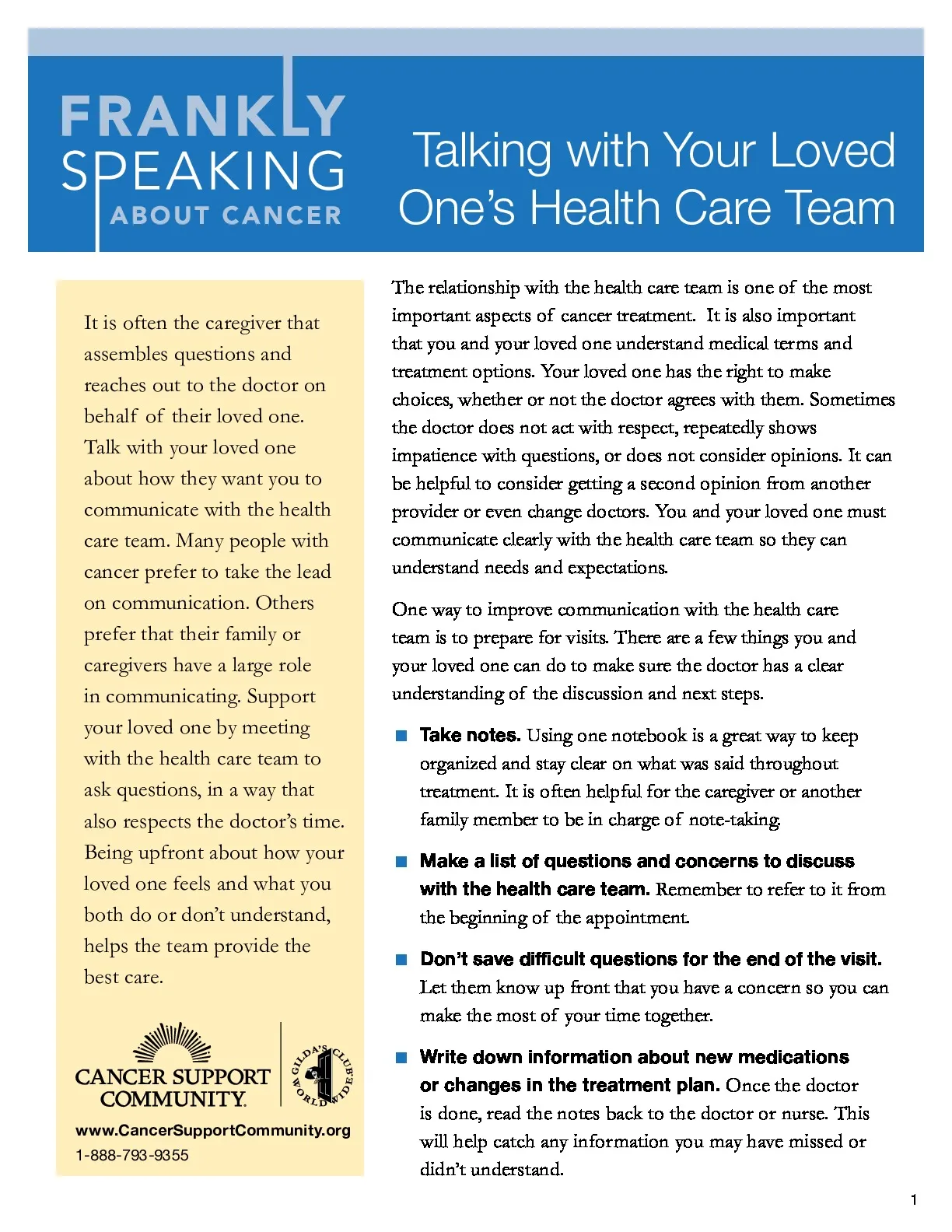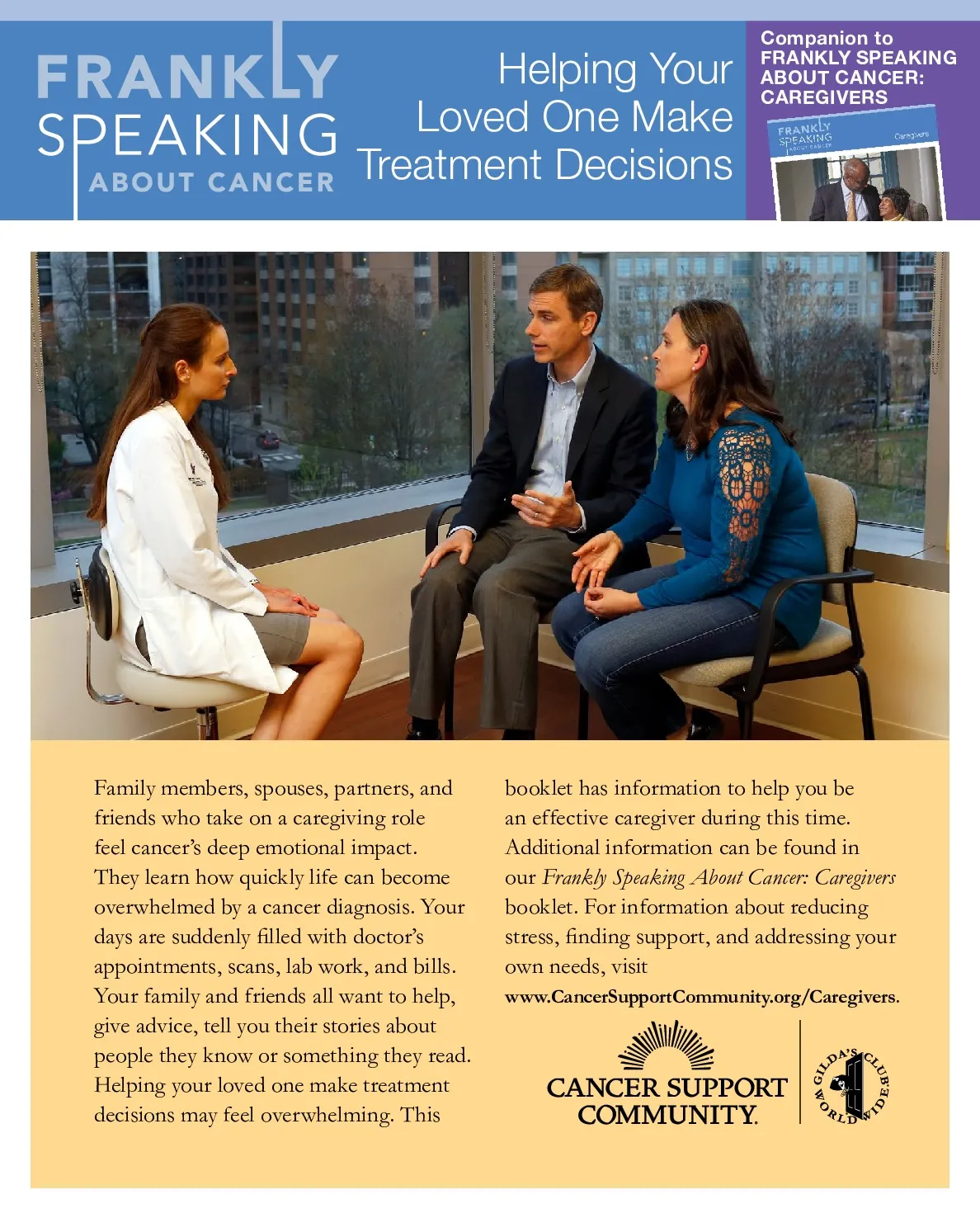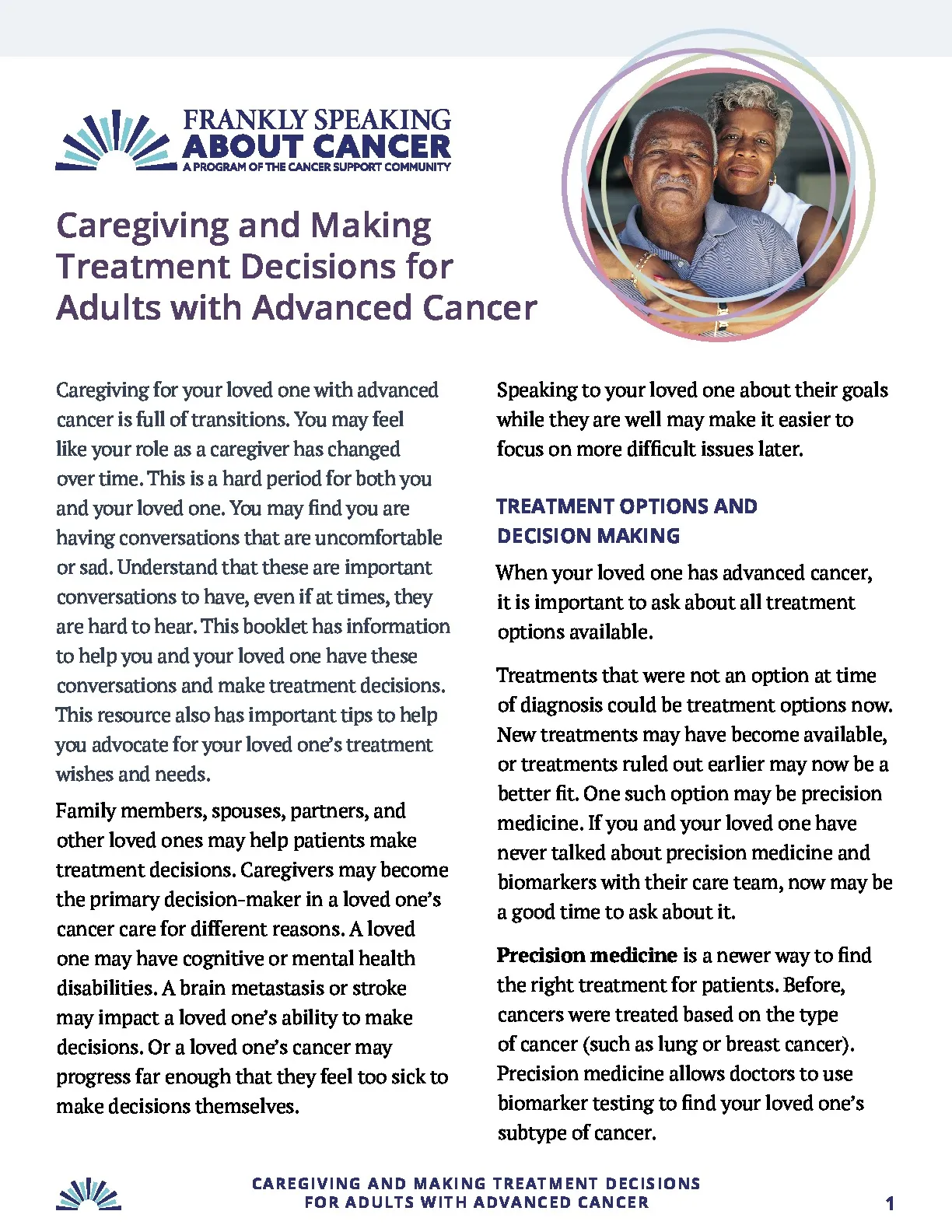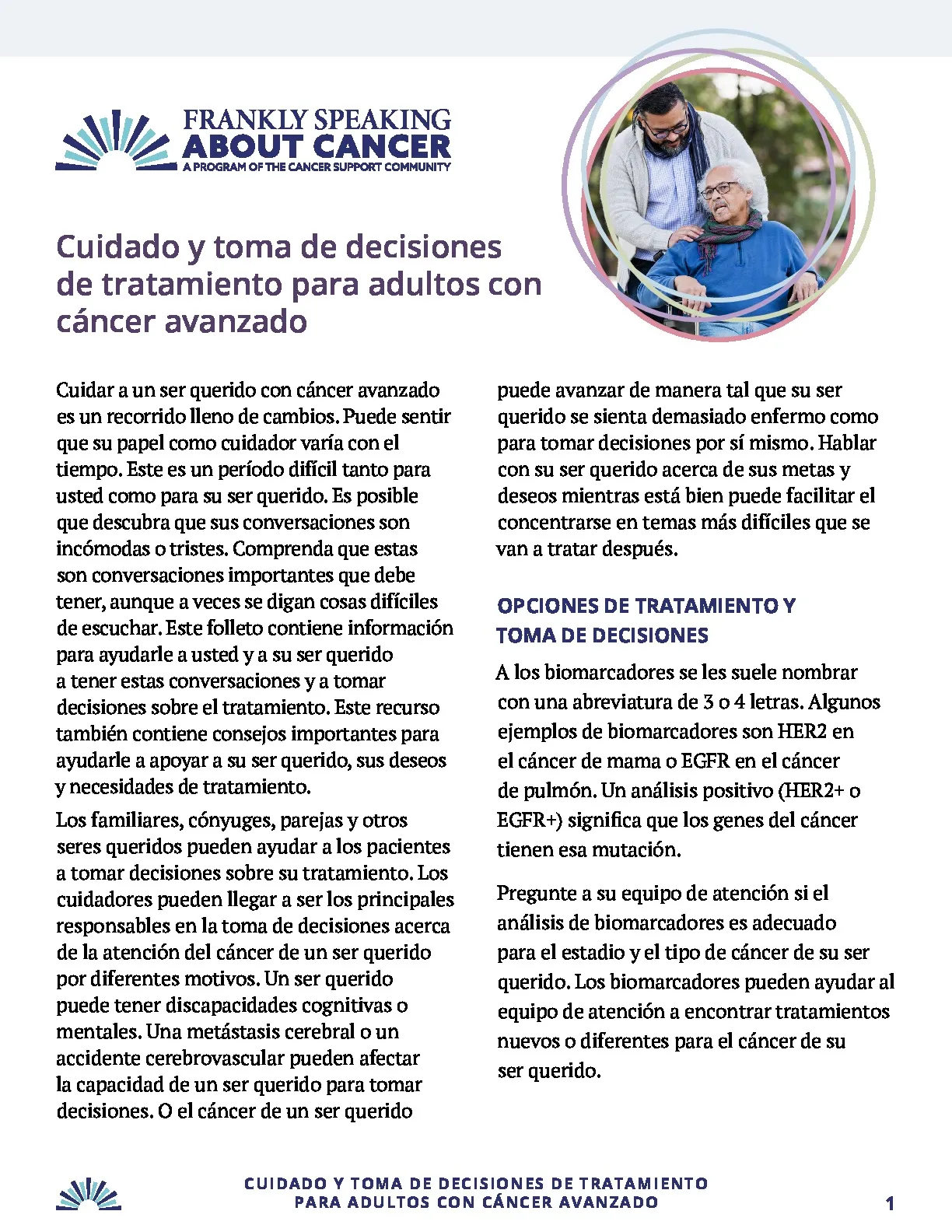Caregivers
Let Us Personalize Your Visit. I am:
If you've already saved your personalized content, login.
Table of Contents
Becoming a Caregiver
The ripples of a cancer diagnosis extend to spouses, partners, siblings, children, and friends. Many of these family members will find they now need to take on the role of caregiver — something they have never done before.
Your main job will be to support and encourage your loved one as they learn about their cancer and make decisions about — and then start — their cancer treatments. What will this involve? Not all caregivers do all of the same things, but a survey of 66 caregivers who are part of our Cancer Experience Registry® found:
- 98% provided emotional support
- 96% went with their loved one to medical appointments
- 82% helped with decision-making
- 79% coordinated medical care
- 80% provided transportation
- 74% helped manage finances
Becoming a caregiver may seem scary or overwhelming. Know that you are not alone: The Caregiver Action Network estimates that, during any given year, more than 65 million people in the United States spend about 20 hours each week caring for an ill, disabled, or aged family member or friend.
There is a growing realization that caregivers need support, and there are programs and services that can help you as you care for your loved one. In fact, many caregivers decide to meet regularly with a social worker or join a family or caregiver support group to make sure they will have the time to talk about their own fears or worries. Support groups are also a good place to get information and advice about caregiving and cancer.
Remember: Sometimes the best thing you can do for your loved one is to just sit quietly together — be present, in the moment, sharing time.
Bridging the Gap: Navigating the Practical Challenges of Cancer Caregiving
Bridging the Gap: Navigating the Practical Challenges of Cancer Caregiving + Enhancing Communication with Your Loved One with Nichole Goble and Christina Bach, MBE, LCSW, OSW-C, FAOSWThere are over 2.8 million cancer caregivers in the United States…

Find a caring and supportive Cancer Support Community location near you.
Search NowThe Caregiver Role & Cancer Treatment
As you and your loved one learn more about the cancer, you will find that you need to go to many medical appointments with many different doctors and you will have an important role to play during this time. Try to keep in mind that caring for someone you love with cancer is about the relationship you share together, and that this relationship is going to have to expand in new ways as you learn to manage the stress that cancer has brought into your lives. You can be a tremendous resource and advocate to help your loved one think through treatment options, goals, and priorities during this difficult period.
As a caregiver, you may feel like you need to “take charge.” But keep in mind that it is your loved one who is in charge. In fact, many people with cancer prefer to do most of the talking with their medical team. If you ask all of the questions, you may make your loved one feel like they are losing control, or having it taken away from them. Also, try not to talk to the doctor in a way that makes your loved one feel left out of the conversation or as if they aren’t in the room. It may be helpful to talk with your loved one before you see the doctor about when, or if, they want you to speak with the healthcare team or take the lead.
What Is a Caregiver?
Sheri, former caregiver of friend with multiple myeloma, discusses the many roles caregivers play.
Finding the Right Doctor
Your loved one will need to see an oncologist — a doctor who specializes in treating cancer. Depending on the type of insurance plan you have, you may have a number of options. How can you narrow this down? Consider contacting a local cancer support group and asking which doctors they recommend. Ask people you know for referrals.
For any type of cancer diagnosis, getting a second opinion is highly recommended. If your loved one is being seen at a community cancer center or by a private doctor, you may want to consider getting a second opinion from a specialist at one of the NCI-designated cancer centers.
Find a Cancer Doctor is another excellent resource for finding a cancer specialist. Created for patients and caregivers by the American Society of Clinical Oncology (ASCO), it allows you to search by location, distance, specialty, language, and more.
Key Questions for the Doctor
These questions can help you and your loved one decide who your loved one’s doctor will be. If your loved one prefers to do the talking, you can help by taking notes. A doctor should feel comfortable answering these questions. If she or he does not want to answer them, find another doctor who will.
- How much experience do you (the doctor) have in treating this specific type of cancer?
- Are you board-certified in medical, surgical, or radiation oncology, or any combination of these?
- Are you and your team up to date on the latest treatments for this type of cancer? What are the most recent advances?
- Do you and the hospital where treatment will be provided accept our insurance?
- Do you have an oncology nurse or oncology social worker on staff to provide us with education and support?
- What other support services are available?
- How and when can we contact you or other members of the cancer team with ongoing questions? (Can we use email? Talk to you on the phone? Or will we only be able to talk to you directly during office visits?)
- Could you give us the name of another oncologist for a second opinion?

Discover Caregiver Tips & Insights
Taking care of someone with cancer can be challenging. Learn ways to navigate the challenges, reduce stress, and get the support you need.
Take Notes During Doctor Visits
Sheri, former caregiver of friend with multiple myeloma, discusses the need to take and keep good notes as a caregiver during doctor visits.

Do You Have a Loved One With Cancer?
What has helped you cope? In just a few steps, you can share your story now and help other caregivers feel less alone.
Treatment Decisions
It is easy to feel like everything about cancer is an emergency and that you must make treatment decisions quickly. In almost all cases, however, you do have time to slow down, think about your loved one’s goals and priorities, and talk with others. Slowing down will allow you to gain a sense of control. Take time to ask questions, think through next steps, and partner with the medical team to develop a treatment plan for your loved one.
Key Questions About Treatment Options
These questions can help your loved one as they make treatment decisions. If your loved one prefers to do the talking, you can help by taking notes. Cancer and its treatments are not always easy to understand. Your loved one should know it is perfectly OK to keep asking questions until everything about the treatment, the treatment schedule, and risks and benefits makes sense.
- What is the goal of treatment?
- Why are you recommending one treatment over another?
- What are the benefits of each treatment?
- What are the risks?
- Are clinical trials an option?
- How can we manage or prepare for possible side effects?
- How often will treatment be given, and where?
- How long does each treatment last?
- Does the facility where treatment will be given also offer resources for emotional support?
- If cost is a concern: Are there ways to help our family with the costs of treatment?
"You have to be upfront; you have to ask the questions that are important."

Caregiving and Advanced Cancer
Caregiving for someone with advanced cancer can be challenging for both you and your loved one. You may find you are having conversations that are uncomfortable or sad. As your loved one is managing their symptoms and side effects, your role may need to shift to adapt to their needs. You may be helping with physical care, emotional support, or logistical needs. You may also be helping with making treatment decisions.
Advance care planning is the ongoing process of making decisions of what a person wants. When talking with your loved one about advance care planning, consider their goals and their values. One of the most important parts of advance care planning is making sure the plan is updated and shared with relevant people. Talk to your loved one and their care team about completing an advance directive. An advance directive is a legal document that is used to make medical decisions if your loved one is unable to make decisions themselves.
The period after treatment ends can open many doors. Most people begin to explore what their “new normal” will be. This can bring a sense of closing one chapter and beginning a new chapter. Life-changing situations such as cancer can give survivors and those around them a chance to pause, learn, grow, and think about life in new ways.
Bottom line: Life is different after cancer. If cancer is a part of your loved one’s life, it brings an opportunity for growth for everyone involved.
Many people affected by cancer consider treatment done after the last chemotherapy or radiation appointment. After these treatments end, however, some people may continue to take certain medications to help keep their cancer from coming back. Some people like this. It makes them feel like they are safe or doing something to keep the cancer from coming back. Others may not be happy about it. Their medication may be a daily reminder of cancer. Also, some of these treatments may have side effects.
As a caregiver, you should ask your loved one or friend how he or she is feeling from time to time. You will need to find the right balance between not asking enough and asking too much. Still, offering to talk is usually helpful.
Some treatments can affect your loved one for years to come. For instance, your loved one may develop issues with their heart, lung, or bones, or with their thinking and memory. Many long-term side effects can be treated, but only if they are identified. You may want to help your loved one find a doctor who has experience treating cancer survivors. You will also want to be sure your loved one has a survivorship care plan.
One of the most common long-term side effects associated with chemotherapy is chemobrain: forgetfulness, lack of concentration, difficulty finding the right words, and difficulty doing more than one thing at the same time. It is something you are likely going to see your loved one experience.
The fear that cancer will return can interfere with every aspect of a person’s life — eating, sleeping, working, and playing. Reminders such as follow-up visits, birthdays, someone else’s diagnosis, an ache, or a bump can all make this fear come to life. Your loved one may not want to talk about it. You may not want to talk about it either. Fear tends to grow in the silence, however, and talking about it may be helpful for both you and your loved one. It may also make your relationship stronger.
When you have questions about the possibility of cancer recurrence or other health concerns, write them down and discuss them at follow-up appointments. To cope with this fear, you may also want to:
- Learn the signs that indicate the cancer may have come back.
- Keep up with medical tests or appointments.
- Talk about it.
- Encourage your loved one to take control of what he or she can, and know what you cannot control.
- Make plans for the future. Short- and long-term plans always help.
Cancer Caregiver Webinar Series
Being a caregiver can be rewarding, exhausting, uplifting, and frustrating — sometimes all on the same day. Knowing how to navigate the experience, without losing sight of your own well-being, is important.
Caregiving 101: An Introduction to Supporting Someone With Cancer
With Dr. Erin Kent. This session will cover an introduction to caregiving to someone with cancer. We will discuss what it means to have a friend or family member diagnosed with cancer and undergoing treatment. We will give an overview of what…
10 Tips for Caregivers Quick Guide
This quick guide gives tips for caregivers of people with cancer. A caregiver is someone who provides emotional support, goes to appointments, helps with decision making, coordinates care, helps with transportation, or helps manage finances. Some…
Family Members and Friends
Cancer can affect a person’s entire social network including:
- Children (young or adult)
- Aging parents
- Siblings
- Other relatives
- Friends and coworkers
Children and Teen Family Members
Children understand the world through their parents. How children react to a loved one’s cancer diagnosis depends very much on how their parents or other close adults are dealing with their own feelings. When a parent is sick or stressed, children of all ages can sense this change, even if they do not know why it is happening. You may not always feel like you know what to say, but it’s always best if you can answer their questions truthfully. Remember to openly express your love for them — especially while your family is trying to manage the stress the cancer may be causing.
Talking with Our Children
Friends and Coworkers
Many people have a wide social network outside the family, such as coworkers, teachers of school-aged children, friends, and neighbors. Some of these relationships will be closer than others, and you may want to tell some people about the cancer diagnosis but not others. If your loved one chooses not to tell coworkers or friends about their cancer, it is important to honor their decision. If you feel the choice conflicts with your own, you should try to discuss this.
If you do tell friends and coworkers, you will likely find that some relationships grow stronger while others become weaker — as is often the case during stressful times. You also are likely to find that you and your loved one’s friends and coworkers may want to help by cooking meals, arranging carpools, or driving your loved one to and from doctor’s appointments.
Our free digital support community easily connects cancer patients and caregivers with friends and family to reduce stress, anxiety, and isolation. Here are some features it offers:
Friends & Family Sites: Consider creating a private community website where your loved one can share updates and receive encouragement from friends and family.
Helping Calendar: When you create a Friends & Family Site, use this tool to coordinate volunteers among friends and family members to help with meals, rides to treatment, childcare, and more.
Caregiver Connection: Join our Caregiver Support discussion board and connect with others like you. Find support and hope, and exchange ideas and stories.
Read Nancy's Experiences & InsightsWhat I lacked in those early months and years of being a cancer caregiver was a community of people who understood. I needed to know that I wasn’t alone in coping with [my husband’s] cancer diagnosis. I needed to get out of my own worried head and hear about the daily struggles and triumphs of other cancer caregivers.
Finding Community
Barry, a caregiver, describes the community that he has found through his cancer journey.
Facing Advanced Cancer
Whether this is the initial diagnosis or the cancer has returned, it is never easy. You and your loved one are now going to have to adjust to a new normal in which you will be dealing with cancer and cancer treatments on an ongoing basis. There will be good times and there will be hard times.
If you were with your loved one the first time he or she had cancer, you have already gained the experience you need to adapt to the situation. If you were not with your loved one the first time she or he had cancer, you will want to talk to them about some of the things that did and did not work well in the past. Together, you will learn how to live with this new reality.
As much as possible, try to share your feelings and concerns about what you are facing with your loved one. If you can cry, laugh, debate, and worry with each other, you will feel a greater sense of connection and understanding. If you are not able to share all of your feelings with your loved one, consider reaching out to a counselor or joining a support group.
As a caregiver for a loved one with advanced cancer, you may want to:
- Reprioritize Together
- Plan Ahead
- Gather Important Documents
- Manage Pain & Other Symptoms
- Review Quality of Life Resources
- Initiate Hard Conversations
One important thing to do is to help your loved one think seriously about his or her priorities. What is most important? How does he or she want to spend her time? Who are the people that matter most in your lives?
Your best, shared decisions will take into account both of your hopes and wishes, family needs, finances, available support, and resources. You may have different feelings about these issues. Your loved one may want to stop working and spend time traveling while you may be worried about paying bills and keeping your job. Your loved one may not want to tell anyone about the new diagnosis, while you may want to tell close friends so that they can help and support you. It is important that you talk about these things and, if necessary, find ways to compromise.
Since your partner is the patient, remember that he or she makes the final decision. However, your opinions are important too, and you need to honestly express your thoughts and feelings. It is generally good advice to avoid making major changes right now. Give yourselves a little time to adjust to this new situation, and then you will be in a better position to know what you need and want to do.
Your loved one’s values and beliefs should guide medical choices, not the other way around. While none of us likes to think about life’s end, most of us do have ideas about what we would and would not like to have happen. It is important to talk about planning for life’s end when your loved one is feeling well, so that you have a plan in place to discuss with the healthcare team. Answers to questions like: “At what point would your loved one wish to stop active treatment?” and “What is most important to them at this time?” can help to guide everyone on the care team.
In general, advance care planning is when a patient decides and writes down their goals and wishes for specific treatments. Knowing what a person wants can help doctors make the right decisions about treatment. Preparing for this to happen will help you not have to make decisions in the middle of a crisis.
There are several important documents to consider for advance planning. If you have questions, please speak with your doctor, nurse, or social worker.
- Advance Directive: This is any statement, oral or written, a person makes about his or her choices for future treatment. It will be very useful if your loved one becomes unable to make decisions. It is best if this is a written document. Most doctors have a state form you can fill out. It is important that your doctor(s) have a copy, and that you and your loved one keep your copy in a place where you can easily get it.
- Health Care Proxy: This allows you to give another person the legal power to make medical decisions for you if and when you no longer can make decisions for yourself. The written form used to appoint the proxy is often called the “durable power of attorney for healthcare.” In many states this form is combined with the advance directive.
- Living Will: This is a legal form that states how you wish to be treated if you can’t make decisions due to illness, injury, or old age. It states whether or not you would like to be placed on life support if your body cannot survive without it.
- Last Will and Testament: A legal document that defines what will be done with property, money, and other possessions (including care for children) after a person passes away. Guardianship for young children or dependents may be a key element of a Last Will and Testament. If a will is not written, state laws will determine how wealth is passed along to family members. This can be a lengthy, and sometimes expensive, process.
There will be a new focus on managing pain and other cancer-related symptoms and side effects, like being tired, nauseated, and, possibly, breathless at times. Encourage your loved one to report all of these symptoms to the doctor so that they can help find relief. In order to help the doctor understand the pain your loved one is experiencing, ask them to describe the pain as best as they can, including:
- where it is
- how it feels
- when it began
- how much it hurts on a scale from 1 (not very painful) to 10 (very, very painful)
It is important for your loved one to take pain medication as prescribed to manage the pain. This is called “staying ahead of the pain.” Talk to you healthcare team about the types of pain medicines available to relieve symptoms.
When a cancer can no longer be cured, you and your loved one will need to make decisions about whether a treatment that may extend life for a few weeks or months is worth taking. If it will have serious side effects, it will affect how your loved one might enjoy those extra weeks or months.
People facing metastatic disease have a variety of needs, including comfort, family support, and guidance. Most people benefit from talking to a hospice or palliative care team. Many people confuse palliative care with hospice. They are not the same.
Palliative care can start at any point in a patient’s experience to treat pain and other symptoms. The goal of palliative care is to achieve comfort, manage symptoms, and improve quality of life. Palliative care is also called symptom management, comfort care, and supportive care. Many medical institutions have a palliative care team made up of doctors and other health providers trained in pain and symptom management. Palliative care is not hospice.
You and your loved one will want to discuss questions such as these with the treatment team:
- How can we reduce the pain?
- How can we improve quality of life?
- What are your loved one’s preferences?
- How can I help the person I care about?
- Are there special things that my loved one wants to experience? What kind of medical support will we need to make that happen?
Hospice care is a coordinated program of care that uses a team of healthcare professionals to reduce pain and other symptoms and support patients and their loved ones in the last months of life. Hospice care involves a team of doctors, nurses, social workers, chaplains, and volunteers.
Respite care is short-term care that helps caregivers take a break from the daily routine and stress of caregiving. It can be provided in your home or elsewhere. Respite care is an essential part of the overall support that families may need to keep a person with late-stage cancer living at home. Sometimes it involves getting a health aide to take care of your loved one while you take time for yourself.
You may wonder how long your loved has to live, and you may experience fear, sadness, and grief when envisioning the future. You may also find it difficult to talk about such painful topics. Finding ways to talk about what is happening can be very helpful to both of you. Most people feel relieved once they begin to have conversations about death and the future. Not only can it help you to know what your loved one’s wishes are, but it also helps both of you feel less alone.
If you are having trouble getting started, seek the help of a social worker or counselor skilled in working with people with cancer, or talk to a spiritual leader you trust. Often, you are both scared. Just admitting your fear may be enough to get the conversation started. Among the most important discussions are those involving hopes about living life. For example, you may want to discuss thoughts about being with family, quality of life, being at home, and making peace with your circumstances, to mention a few. Perhaps these can be uplifting conversations that give you both a sense of peace.
As you think about losing your loved one, there are specific things you can do to take care of yourself. You may want to:
- Think about what you can do to take care of yourself. Taking a walk, getting rest, drinking less alcohol, and eating well will help you find the strength you need to manage your emotions.
- Give yourself permission to take a break from your sadness. It is OK to laugh or have fun in order to relieve the stress and tension that grief brings into our lives.
- Consider ways to deal with your fears and emotions by talking with a professional, faith leader, or joining a support group for caregivers or a bereavement group.
- Know that you may experience a range of emotions including sorrow, anger, relief, confusion, and a deep sense of longing.
- Relax your expectations of yourself. You may not be able to do all the things you are used to doing and that is OK.
- Remember that everyone goes through this process in their own way and at their own pace. There is no “right” way.
- The loss of a loved one can be a roller coaster of emotions and deep sadness is a normal response. If you feel a deep sense of guilt, thoughts of suicide, can’t stop thinking about death or dying, or can’t function in your daily life, please seek the help of a professional counselor.
You Find Strength
Elaine R., caregiver for husband with melanoma, discusses finding inner strength and the importance of relying of others for help.
Being a Caregiver
Watch as others talk about their experience in being a caregiver.
Frankly Speaking About Cancer Library
LibraryWould you like a print copy of these educational materials?
We can mail our Frankly Speaking About Cancer pieces to you. Shipping is free for up to 20 pounds.















